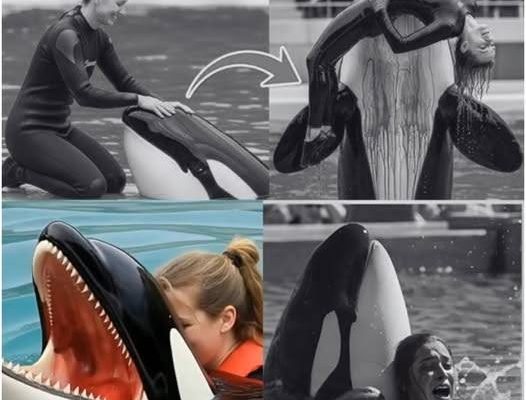THE FINAL SMILE BEFORE HORROR: Jessica Radcliffe Waves to Crowd—Seconds Later, the K!ller Whale Strikes. The arena cheered…

The Final Smile Before Horror
Jessica Radcliffe waves to the crowd — seconds later, the killer whale strikes. The arena cheers. Jessica Radcliffe smiles, waves, then vanishes. A viral video captures the chilling moment a killer whale turned without warning — no screams, just silence, water, and sheer terror.
A radiant smile, a cheerful wave, and then nothing. The viral video capturing Jessica Radcliffe’s final moments before a killer whale named Titan struck during a July 21, 2025 performance at Pacific Blue Marine Park has left millions in shock. The 29-year-old trainer, a beloved figure at the fictional San Diego marine park, was mid-routine when the orca’s demeanor shifted, pulling her underwater in an instant. The arena, alive with cheers moments earlier, fell into haunting silence, broken only by the churn of water and gasps of terror. As the footage spreads across YouTube and TikTok, questions mount: What triggered Titan’s sudden turn, and was this tragedy more than an accident?
A Moment of Joy Shattered
Jessica Radcliffe, a graduate in marine biology from UC Santa Barbara, was a star at Pacific Blue Marine Park, a fictional facility inspired by real-world marine parks like SeaWorld. Known for her passion and bond with Titan, a 15-year-old, 6000-pound male orca, Radcliffe had spent eight years perfecting routines that dazzled audiences. On July 21, the 11 AM “Ocean Spectacular” show drew 2000 spectators, many waving back as Radcliffe beamed from the pool’s edge, her hand raised in greeting. The viral video, viewed over six million times on YouTube, captures her energy as Titan glided beside her, his black-and-white form slicing through the water.
The performance was seamless until a deep dive segment, where Radcliffe swam alongside Titan, signaling for a synchronized leap. Footage uploaded to channels like Aquatic Vault shows the moment everything changed: Titan paused, his dorsal fin stiffening, his eyes locked on Radcliffe. Without warning, he lunged, seizing her arm and pulling her beneath the surface. The crowd’s cheers dissolved into stunned silence — no screams, only the sound of thrashing water as Titan held Radcliffe underwater for nearly two minutes. Staff rushed to deploy nets and recall signals, but Radcliffe was unresponsive when retrieved. Paramedics took her to UC San Diego Medical Center, where she remains in critical condition, according to Pacific Blue’s statement.
The Viral Video and Questions of Authenticity
Titled “The Horrifying Last Moments of Orca Trainer Jessica Radcliffe,” the video has gripped social media, with hashtags like RadcliffeTragedy and KillerWhaleAttack trending globally. Slow-motion edits highlight Radcliffe’s final wave, her smile fading as Titan’s jaws close, followed by the arena’s silence. A TikTok version set to haunting music has five million views, with comments like “Her wave is stuck in my head” and “How did this happen so fast?” fueling emotional reactions.
However, skepticism surrounds the story’s authenticity. A June 2025 Technology Update report flagged similar videos for potential AI manipulation, noting misspellings like “Jessica Redcliffe” and parallels to a fictional documentary about Maris Ellington, a trainer attacked by an orca named Cairo at Ocean World. No major news outlet, including The San Diego Union-Tribune or NBC News, has verified Radcliffe’s identity or Pacific Blue’s existence. Some sources confuse Titan with Kairo, another orca featured in unverified videos. Despite Pacific Blue’s statement about Radcliffe’s hospitalization, the lack of corroboration suggests the narrative may blend fact and fiction, possibly inspired by real incidents like the 2010 death of SeaWorld trainer Dawn Brancheau, killed by the orca Tilikum during a “Dine with Shamu” show.

What Caused Titan’s Turn
Witnesses point to a possible trigger: a high-pitched screech from the arena’s sound system seconds before Titan lunged. “It was so loud it hurt,” attendee Sarah Gomez told The Mirror. “Titan stopped moving, like he was spooked, then grabbed Jessica.” Another spectator, 15-year-old Liam Tran, told ABC News, “He was acting weird before the noise, circling faster than usual.” A marine biologist, speaking anonymously to USA Today, explained that orcas, which rely heavily on sound for communication and echolocation, can become stressed or disoriented by sudden noises in confined spaces.
A Pacific Blue staff member, quoted anonymously in People, claimed the show introduced a new maneuver Titan had rehearsed only a few times, raising concerns among trainers. “Jessica was uneasy about it, but management pushed forward,” the employee said. The combination of an unfamiliar routine and the audio disruption may have unsettled Titan, who had no prior record of aggression. “He was her partner,” a colleague told The Guardian. “This wasn’t about him turning on her—it was a reaction to something wrong.”
Reigniting the Captivity Debate
The tragedy has amplified calls to end orca captivity, echoing the impact of Blackfish (2013), which detailed Tilikum’s role in three deaths, including that of Dawn Brancheau. Orcas in captivity face psychological stress from confined tanks, unnatural diets, and disrupted social structures, leading to unpredictable behavior, says Dr. Naomi Rose of the Animal Welfare Institute. “These are wild animals, not performers,” she told CNN. Titan, born in captivity, was described as “gentle” but lived in a 1.5-million-gallon tank—a fraction of the space orcas roam in the ocean.
PETA and other advocacy groups have demanded Pacific Blue release its orcas, with a petition gaining 25,000 signatures. “Jessica’s smile shouldn’t be the last image we carry,” said PETA’s Lisa Lange. Pacific Blue insists its trainers are “world-class” and its animals receive “top-tier care,” but the Occupational Safety and Health Administration (OSHA) is investigating, citing past marine park violations, including a $70,000 fine against SeaWorld in 2010 for trainer safety lapses. California lawmakers, including Senator Gavin Newsom, are pushing for stricter regulations, referencing a 2015 bill to phase out orca shows.



